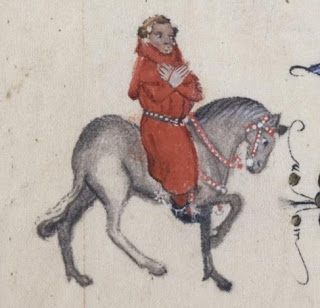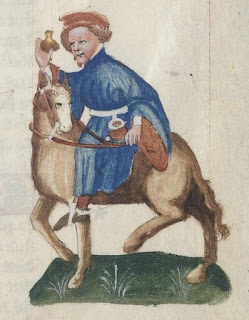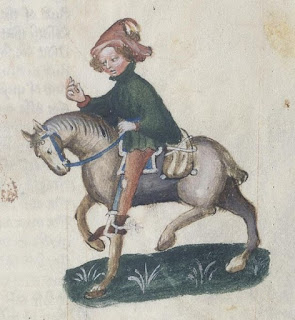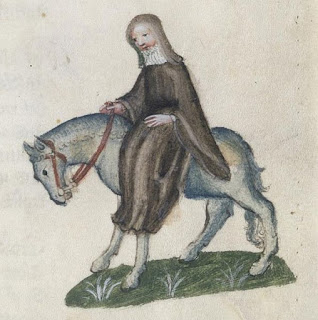Monthly Archives: November 2015
Hamlet ~ Act IV Scene II
Hamlet ~ Act IV Scene II
Rosencrantz and Guildenstern turn up to question Hamlet about the body of Polonius. Hamlet again speaks very insightful nonsense to them, which they do not appear to understand. Finally he agrees to be taken to the king.
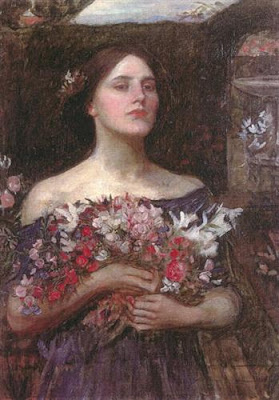 |
| Gather Ye Rosebuds, or Ophelia (1908) John William Waterhouse source Wikiart |
Thoughts:
I wonder …… are Rosencrantz and Guildenstern dense? They are carrying out Claudius’ orders without question, and the copious insults that Hamlet flings at them, seem to pass right over their heads.
What exactly did Hamlet mean when he said “The body is with the king, but the king is not with the body …” Is this a reference to his father’s murder, in that his dead body the responsibility of Claudius, but Claudius is not physically with it? Or what he hinting that Claudius was actually to blame for the death of Polonius, even though he wasn’t physically with the body?
The Canterbury Tales ~~ The Parson’s Prologue and Tale
When The Manciple’s Tale ends, the party is approaching the edge of a village. The Host declares that they have almost heard a tale from each “social class,” pegs the Parson as someone long-winded and begs a tale of fiction, but the Parson refuses. To tell fiction, one must abandon truth. He will tell a tale based on morality and virtue but, because he’s a Southern man, he does not have the ability to speak in verse, so prose it must be. They all agree to his terms, thinking that a virtuous tale would be a good ending, but the Host begs him to hurry, as the sun is soon to set.
 |
| The Triumph of Virtue over Vice (1556) Paolo Veronese source Wikiart |
The Parson’s Tale
Part I
The Parson declares that although there are many ways to lead people to Christ, one most noble way is Penitence, and knowing everything about Penitence will do a man good. Penitence is “the lamentation of man who sorrows for his sin and punishes himself because he has done wrong”; yet this penitence must be sincere. His sermon continues, covering the effects and species of Penitence, and what constitutes true Penitence.
With regard to Contrition, there are six causes that move a man to it:
- a man must remember his sins with shame
- sin puts man in greater slavery
- a dread of the “day of doom”
- remembrance of the good that man has failed to do on earth, and the good works that he has lost
- a remembrance of the depth of Christ’s suffering for our sins
- the hope of 1) forgiveness of sin; 2) the gift of grace, and 3) the glory of heaven
Contrition needs the stalwart purpose of confession to destroy the hold of the devil and restore the gifts of the spirit. Sin severs us from communion but confession restores broken bonds.
 |
| The Parson’s Tale (1913) W. Russell Flint Source |
Part II
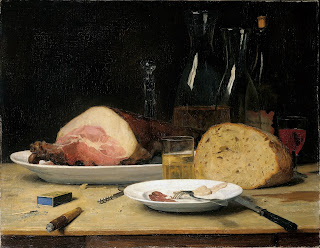 |
| Excess (1896) Albert Anker source Wikimedia Commons |
Confession is the second part of Penitence, which includes a true revealing of sins to the priest. If a man opens himself to covetousness (concupiscence), he is open to sin. There is either venial sin, in which man loves Christ not as much as he ought, or deadly sin in which man loves something more than Christ. The more a man “burdens his soul with venial sins”, the more likely he is to fall into deadly sin. There are also venial sins which are not so obvious, and the Parson lists those things, such as eating more than is necessary for sustenance, not caring for the sick or the poor, speaking idle words of villainy or folly, slandering your neighbour, etc., etc. No man can avoid venial sins but all men can restrain themselves, or be restored by prayers, confession, good works, and other church traditions.
| The Seven Deadly Sins Pieter Bruegel the Elder source Wikimedia Commons |
The Seven Deadly Sins
Pride: Pride is the chief deadly sin, and from it spring all other sins. The Parson lists a number of prideful behaviours, but then introduces another form of pride, a type of self-righteous holiness.
| The Seven Deadly Sins & the Four Last Things Pride {Superbia} (1485) Hieronymus Bosch source Wikimedia Commons |
Two manners of Pride exist, one within the heart of man and one without. Pride of outside appearance in clothing is frowned upon, and the Parson appears particularly scandalized at the display of the male member and buttocks in fashion. As for women, one can read their character in their appearance, despite how they may behave. It is not that he eschews decent clothes, only attire that displays the sin of Pride.
Pride can spring from blessings of body or soul, knowledge, good memory, riches, etc., etc. We can hold these things to our detriment or to our profit, depending on how we use them. He also emphasized grace in power, in that a lord should treat his servants well, and warns that he could have fortune one day and captivity the next.
Humility and meekness are remedies against Pride, yet there are three types of humility: humility of heart, humility of mouth, and humility of deeds.
 |
| The Seven Deadly Sins & The Four Last Things Invidia {Envy} (1485) Hieronymus Bosch Source Wikimedia Commons |
Envy: A sin of sorrow for others’ wellbeing and a delight in their struggles. Envy springs from malice but there are two kinds of malice: 1) hardness of heart in evil, and; 2) the blindness of man. Envy is loathsome because it is against all virtues and not just one. There are many manners of envy with many sub-categories and the Parson covers every one.
Remedies against envy: 1) love God & your neighbour as yourself and; 2) love your enemy.
| The Seven Deadly Sins & the Four Last Things Anger {Ira} (1485) Hieronymus Bosch source Wikimedia Commons |
Anger: Anger arises from Envy which issues from Pride. Augustine describes Anger as a wish to be avenged by word or deed, but the Parson claims that there is a good anger and a bad anger. The good anger is the anger against wickedness, not angry with the man but against the misdeed of the man. Bad anger can be either a sudden anger, or a planned anger, the first a venial sin, the second a deadly sin. Anger destroys spiritual things.
Treating people unfairly, such as charging excess rents or taxes, or withholding care from the poor is, interestingly, called homicide, for “unless thou feedest him, thou slayest him.” Do not swear, or lie, or flatter, or reproach, or sow discord, etc. There are copious examples and sub-examples of anger, which go on for a looooong time.
The remedy for anger is humility, or meekness, and patience, or suffering.
 |
| The Seven Deady Sins & The Four Last Things Sloth {Accidia} (1485) Hieronymus Bosch source Wikimedia Commons |
Sloth: This sin makes a man “heavy, thoughtful and fretful,” and prevents him from doing good works. Sloth is soooo delicate and careless that he cannot tolerate any firmness or punishment, so therefore everything one does comes to naught. “Wanhope” is a type of sloth that comes from despair in the goodness of Christ, thinking that one is too sinful for his forgiveness, culminating in defeat. Next is idleness, which opens the door to other sins such as evil thoughts, gossip, etc. Tardiness follows, where a man thinks that he has all the time in the world to return to God, and lastly, laziness. A lazy man will do a poor job and stint on his work, if he comes upon difficulty or becomes frustrated.
The remedy for sloth is building up a fortitude to abhor destructive behaviours and things. The species of fortitude are: 1) magnaminity, or great valor; 2) faith and hope in God and his saints; 3) security and self-confidence; 4) magnificence, and; 5) constancy.
 |
| The Seven Deadly Sins & The Four Last Things Avarice {Avaricia} (1485) Hieronymus Bosch source Wikimedia Commons |
Avarice: Avarice is the root of all evil because it seeks wordly things instead of heavenly things. Greed is not only an inordinate desire for material goods, but for knowledge, fame, etc. It is coveting things you do not have, but also keeping things that you do not truly need. The greedy man has more hope in his possessions than in Christ, and his desires put him in bondage. Thus follows extreme detail on bondage.
Mercy and pity, relieve the sin of avarice. Reasonable generosity is also a remedy.
 |
| The Seven Deadly Sins and The Four Last Things Gluttony {Gula} (1485) Hieronymus Bosch source Wikimedia Commons |
Gluttony: The overindulgence in food or drink, where a man makes his belly, his god. Drunkenness begets loss of reason. Otherwise all his descriptions of gluttony sound startlingly like the manner in which we eat nowadays.
- Eating before it is time to eat
- Eating too delicate food and drink
- Eating more food than is necessary
- Elaborate adornment and preparation of food
- Eating too greedily
The remedy of gluttony is abstinence, along with its fellow-remedies of temperance, shame, satisfaction, moderation, soberness, and frugality.
 |
| The Seven Deadly Sins and the Four Last Things Lechery {Luxuria} (1485) Hieronymus Bosch source Wikipedia Commons |
Lechery: A cousin to gluttony is the sin of lechery, or lust. Adultery is a “stinking sin”, where not only the deed is forbidden, but the desire also. By this sin, the devil wins most of the world. Do not:
- Look, for “the desire of the eyes, follow the desire of the heart.”
- Touch
- Use foul words
- Kiss
- Act lecherously
A precise description of all levels of lechery follows.
To remedy this sin, one must employ chastity and continence (self-control). True marriage makes two hearts united, as well as bodies. A man should be patient with his wife and revere her. Woman is subject to man, but a man should love his wife so much that he would die for her. Other remedies are (get ready!) the withdrawal of ease, withdrawal of eating and drinking, sleeping long and in great quiet, and shunning that by which he/she is tempted.
 |
| The Confession (1838) Guiseppe Molteni source Wikimedia Commons |
The Parson declares that it is good to understand the circumstances which provoke sin, and gives us, again, numerous examples. The more one sins, the easier it is to sin, and the more adverse one is to confessing them.
For a man to make a sincere confession, it must be with: 1) a sense of shame; 2) a humility in confession; 3) a presence of tears, if not in the eyes, then in the heart; 4) no hesitation for feeling shame, and; 5) an obedience to accept the penance dealt out. A confession also must be hastily sought, of free will, lawful, free of lies, and have no hypocrisy.
Communion should be taken at least once per year, because everything renews itself annually.
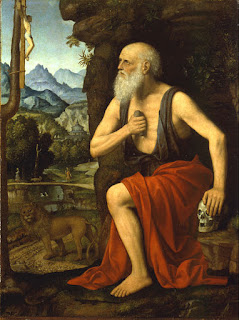 |
| St. Jerome in Penitence (c. 1525) Bernardino Luini source Wikimedia Commons |
Part III
The third part of Penitence is Satisfaction, which involves alms and bodily pain.
Of alms, there are three types: 1) contrition of the heart; 2) pity on the sins of his neighbours, and; 3) giving to those in need, such things as counsel, comfort, food and drink, clothing, lodging, etc.
Concerning bodily pain, it consists of prayers, fasting, keeping vigil and the teaching of orisons. One may not think these things very painful, but the Parson seems to be referring to the pain of discipline and self-control …… doing things we perhaps do not wish to do for the good of ourselves or others. He mentions having discipline in the case of being whipped, in tribulations, sickness, in the loss of a wife or child, or worldly possessions.
He covers the consequences of not making a sincere confession, and other things that impede confession.
The fruit of penance is the bliss of heaven.
 |
| The Parson’s Tale (1913) W. Russell Flint source |
I must say that in simply reading this sermon, I clearly understood penance and bodily pain. Could this have been the Parson’s purpose? This tale was sooooooo long, so detailed, and it read like a legal brief, without say, any dry Ciceronian wit. I actually quite loved it for the first half, but soon it was just too much, and I admit that I was glad when it ended. Yet for all that, it had some very good points.
I must say I quite liked how some of the church Fathers explained hell:
“To wretched caitiffs shall be death without death, and end without end, and lack without end. For their death shall always live, and their end shall evermore begin, and their lack shall not cease.” Saint Gregory
“They shall follow death, and they shall not find him; and they shall desire to die, and death shall flee from them.” John the Evangelist
I was surprised at the emphasis placed on the order of things Reason is also highlighted. Each sin is explained in copious detail, yet the Parson shows expert insight into human nature, and his words are often convicting. His advocation includes compassion, grace, lords to treat their servants well, as well as admonishing “unworthy priests and ignorant curates,” so much of his talk was edifying. However, looking at this tale from a non-Catholic viewpoint, the heavy emphasis on penance and sin became startling, not necessarily for the content, but for the length. Jesus came to take men’s sin on himself, and we are saved by grace, yet I think the Parson loses much of that in his worldview. Certainly we should be aware of everything that he touched on, and confession and repentance are necessary, but the fear and the shame that comes with it are out of my scope of understanding.
The Parson’s Tale is the last of the tales before the final Chaucer’s Retraction, and is perhaps very fitting in its placement. The characters are going on a pilgrimage, each probably ruminating on their lives and the different paths they have taken or would like to take. The Parson gives them a nudge, with his sermon, on the path of salvation. He also, with great acumen, touches on a number of sins that plague his fellow travellers, giving them a way to escape them if they so choose.
Hamlet ~ Act IV Scene I
Hamlet ~ Act IV Scene I
Gertrude relates all to Claudius about her meeting with Hamlet, including the death of Polonius. Claudius laments Hamlet’s state, his act and his own position. He calls for Guildenstern, revealing Hamlet’s dreadful deed and commands him to bring the corpse to the chapel. He then declares that he will tell their wisest friends of his planned action, hoping that the effects of this act, will not tarnish their reputation.
 |
| Ophelia (1863) Arthur Hughes source Wikiart |
Thoughts:
This scene is very short but still enlightening. In spite of Gertrude’s promise of silence to Hamlet, she immediately reveals to Claudius everything that had passed between them. Or does she? She only reveals her opinion that Hamlet is mad, yet does not say that he is playing at being mad. So, in effect, did she really keep her pledge?
It’s fascinating that Claudius blames himself for Hamlet’s actions in the death of Polonius. He claims his guilt is because he did not restrain his nephew, but is there other guilt that is affecting his feelings?
Again, Claudius is calling on others to support his actions, making them at least partially responsible for the course on which he decides. Is this a crafty political move, or does Claudius’ simply need emotional support in his new position?
The Canterbury Tales ~~ The Manciple’s Prologue and Tale
Is it my imagination or, as we are nearly at the end of these tales, are the pictures of the pilgrims improving? Or perhaps they are only better preserved. A Manciple, for those who don’t know (me!), is a purchasing agent for a college, monastery or other institution.
The Host wishes the Cook to tell the next tale but, sadly, the Cook is dead drunk, and the Manciple offers to take his place, merrily deriding the Cook for his condition. Enraged, the Cook attempts to strike the Manciple but ends up falling from his horse. The pilgrims manage to remount him on his hack and the Manciple is scolded for chiding the Cook, and, to make up, the Manciple offers the Cook a drink. He then begins his tale.
The Manciple’s Tale
 |
| Phoebus and Boreas (1879) Gustave Moreau source Wikiart |
Phoebus, renown for his nobility and skill with bow and arrows, had his dwelling on earth. An artful singer in his own right, the handsome Phoebus had a crow which he kept in a cage. Now this crow had snowy white feathers, a song that would rival the Sirens, and could mimic any sound that it heard.
Phoebus also had a lovely wife, who he loved more than he loved his own life. Jealous for his spouse’s love, he ensured that he acted toward her with kindness and manly conduct, confident that she would not stray from his affections. But a caged bird, wishes for its freedom no matter what its treatment and:
“(A good wife) Should not be checked and spied on, that is plain,
And truly it is labour all in vain
To check a wicked wife; it can’t be done.
It’s imbecility, say I for one,
For men to waste their labour checking wives,
And so the ancients say who wrote their lives.”
Middle English:
One day, when Phoebus was away, his wife sent for her “bully”, and proceeded to deceive her husband, as the crow in its cage looked on. When Phoebus returned, the crow trilled out the words, “Cuckoo! Cuckoo!” and then informed Phoebus of his wife’s indiscretion. In a towering rage, Phoebus slew his wife, yet immediately remorse came upon him for his deed.
“O fainting trust, O prompting to suspect,
Where was your thought and wisdom to direct?
O every man, beware how you are moved,
Never believe but what is strongly proved!
Strike not too soon, ere you can reason why,
Be soberly advised before you try
To execute your justice and assuage
Suspicion by the acting of your rage.
Alas, a thousand in their hasty ire
Have been undone and brought into the mire.”
Middle English:
He verbally flayed the crow for its thoughtless revelation and placed on it a curse, that it would forever wear feathers of black, its powers of speech would be taken, and its lovely voice would be transformed to a croak.
The Manciple conveys the moral of the story, instructing “his son” to hold his tongue, do not use words idly, refrain from superfluous thoughtless speech, guard his tongue, and not be a chatterbox.
“Wherever you may be, with high or low,
Refrain your tongue and think upon the crow.”
Middle English:
 |
| The Manciple’s Tale (1913) W. Russell Flint Source |
This tale was perhaps the most confusing of all of the tales. Of course, Phoebus’ wife didn’t deserve death for her infidelity, but why was it so terrible for Phoebus to be advised of what she had done? The crow only told the truth. Was it the manner in which he told the truth? Instead of having concern for the feelings of Phoebus and telling him privately, he blurted out the truth like a scandalmonger, with a sort of glee? I’m really puzzled. In any case, it is obvious from the start that the Manciple is a merry soul, who likes to tease and twist situations. Can we even take him seriously?
This story was taken from Ovid’s Metamorphoses, which I hope to read next year, so I will be able to do a comparison.
Remembrance Day 2015
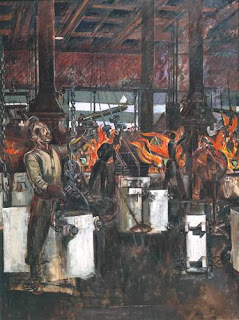 |
| A Canadian War Factory (1943) Wyndham Lewis source Wikiart |
I can’t forget to stop and honour all the men and women who have fought and lost their lives in wars past and present, so that we are able to have the freedom that we enjoy in Canada, and other countries in the world. Heroes they remain, as they were willing to fight when their country needed them.
His stars eternally.
Hamlet ~~ Act III Scene IV
Hamlet ~~ Act III Scene IV
| Hamlet and his Mother Eugene Delacroix source Wikimedia Commons |
The Ghost enters the room and admits that he has come to agitate Hamlet’s tardy actions, but he also shows concern for Gertrude’s horrified reaction and instructs Hamlet to calm her. Hamlet speaks to the Ghost, but Gertrude does not see it and fears for Hamlet’s sanity. Hamlet declares that he is not mad, warning his mother not to turn the focus to madness, but remember her crime and repent of it. By refraining from going to his uncle’s bed that night, she can begin cultivating good habits within herself. He cautions her not to tell Claudius that his madness is all contrived, yet for a purpose, to which his mother promises her silence. And off to England, he will go with his school chums whom he trusts like adders. Exit Hamlet, dragging away the body of Polonius.
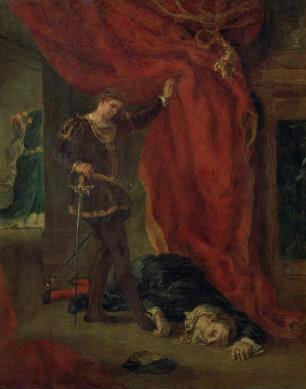 |
| Hamlet devant le corps de Polonius Eugène Delacroix source Wikipedia Commons |
Thoughts:
While Hamlet seems to regret the death of Polonius on one level, he appears to think that his death was willed by Heaven or fate. I can understand why Hamlet believes himself a scourge, or executioner, but I’m a little unclear as to why he is a “minister”. Does he think he is administering justice because Polonius, in effect, is supporting Claudius and Gertrude, and therefore supporting their actions? He obviously sees Polonius as a brainless busybody, but he also calls him a fool, which perhaps excuses him from some of his actions.
With regard to the Ghost, it is interesting that in this case, Hamlet can see him, but Gertrude cannot. It might be useful to remember the people who can see the Ghost and those who can’t; it may have some sort of bearing on their character or position in the play.
There are more references to words in this scene. Polonius was full of them, but they were often meaningless and ridiculous. Hamlet’s words are twisted, often appearing ridiculous but usually pregnant with meaning. Does Gertrude use words to cover the realization of her actions, even from herself?
The Canterbury Tales ~~ The Canon’s Yeoman’s Prologue & Tale
I just bought an Oxford’s World’s Classics The Canterbury Tales and I must say that I’m not very pleased with it. It’s easily understood but they have completely jettisoned the rhyming pattern, which is imperative for truly enjoying these tales.
So, moving on …….. The pilgrims see a dapple-grey horse and a rider in black, both sweating as if they had ridden from afar. From a detailed observation of the new visitor, it appears as if he’s a canon of the church.
 |
| An Alchemist (1661) Adriaen van Ostade source Wikiart |
The canon’s yeoman confesses that he saw the pilgrims leave the inn at the beginning of the day and suggested to his master, the canon, that they join up with the party. The Host appears to enjoy the the well-mannered yeoman and gives them a hearty welcome, inquiring if the canon has a tale to tell. The Yeoman breaks in, divulging that his master is a great joker, but he is more than a cleric; he is a man who has powers that can turn their road to Canterbury into silver and gold. In fact, he is an alchemist.
Impressed with the yeoman’s description of his master, the Host nevertheless inquires why he is dressed in such a raggedy, slovenly manner. The Yeoman claims his master is clever, but he uses his brains foolishly. At the Host’s prompting, he reveals that they live in slums and holes and alleys, but during their discussion the canon sidles up and, disturbed by the bent of the conversation, attempts to silence his yeoman, concerned that all his secrets will be revealed. The Host supports the yeoman, and when the canon sees his reprimands will be to no avail, he flees and the yeoman is free to reveal all.
The Canon’s Yeoman’s Tale
Part 1
 |
| The Philosopher’s Stone (1940) Victor Brauner source Wikiart |
Part II
 |
| The Alchemists Pietro Longhi source Wikiart |
 |
| Alchemist Sendivogius (1867) Jan Matejko source Wikiart |
The two characters in this tale. the Canon and his Yeoman, are not part of the original group of pilgrims. Chaucer appears to have inserted them to address the crime of alchemy and its exploitation and debasements. Curiously, references to dishonest alchemists were rare during Chaucer’s time, as alchemy only began in the 14th & 15th centuries and did not become truly popular until the Renaissance. Even so, Chaucer’s knowledge of alchemy appears to be detailed and accurate as was supported by a 17th century examination of this tale.
The Canturbury Tales ~~ The Second Nun’s Prologue and Tale
This Second Nun jumps right into her tale, cautioning her listeners to beware of Idleness. Reason teaches us to shun this pastime, as it makes us numb to the world and causes ruin.
Next, she gives the Invocacio ad Mariam, in which she invokes Mary as her Muse, praising her attributes and asking for her assistance. Faith without works is dead, and Mary must help her to tell her tale.
An Interpretatio Nominis Ceciliae follows, where the origin and meaning of Cecilia’s name is described in detail. In effect, it means “Lily of Heaven,” the white signifying her virginity and pureness.
 |
| Saint Cecilia (1605) source Wikipedia |
The Second Nun’s Tale
| Cecilia with an Angel (1618-1621) Gentileschi source Wikipedia |
Cecilia was a Roman noblewoman, who prayed to God without ceasing. In spite of her desire to remain a virgin, she is married to Valerian. Concerning their physical relationship to come, she continues to pray for purity for her body and soul. To Valerian she relates that she has a guardian angel who will strike him dead if he touches her with love or lust, but, if he loves her “cleanly,” the angel will show him glory. He asks for visual proof of this angel, and Cecilia professes that he must believe and be baptized and then follow the Appian Way until he comes to a village. There he will meet Pope Urban, and if he confesses, he will see the angel. All happens as his wife says it will, and when he returns home, he finds Cecilia with the angel who announces that he will grant him one request. Valerian wants his brother, Tiburce, to be baptized as well. His wish is granted.
Yet the two brothers are brought before the Roman authorities. If they refuse to sacrifice to Jupiter, their heads will be struck from their bodies. Seized by a clerk, Maximus, Valerian and Tiburce manage to garner the sympathy of the clerk and the executioners, and lead them to a faith in God. Nevertheless the Roman prefect, Almachius, knows of their refusal and beheads them and Maximus, claiming that he saw their souls soar to Heaven. The poor clerk is beaten to death with ropes of lead. Cecilia buries the three of them together.
 |
| Cecilia’s Trial (1611) Domenichino source Wikipedia |
Almachius, hearing of Cecilia’s deeds, has her brought to him, whereupon she denounces him and his stone gods in words most unflattering, stoking Almachius’ ire. He orders her to be boiled in a flaming bath, but Cecilia manages to sit in it for a night and a day without it doing any damage to her whatsoever. Determined to bring about her death, Almachius sends an executioner to chop off her head. One, two, three blows are delivered by the executioner but he is unable to separate her head from her body and she lives three more days with a partially severed head, tormented but preaching and converting people. She finds Saint Urban, bestows upon him her goods, and instructs that her house be used as a church, before she is born away to heaven, and Urban buries her body.
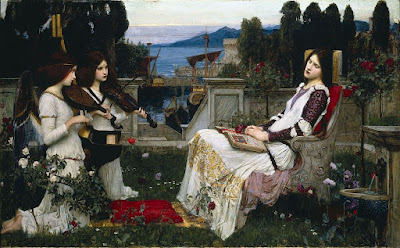 |
| Saint Cecilia (1895) John William Waterhouse “In a clear walled city on the sea. Near gilded organ pipes — slept St. Cecily” source Wikipedia |
These tales of virgin saints must have been reasonably familiar during Chaucer’s times, yet I’m not sure if I’ve ever heard of a married virgin saint. This tale perhaps fits with The Wife of Bath, in that in the Wife’s tale, she controls her husband with sex, power and deceit, whereas in this tale Cecilia influences her husband spiritually, with her goodness and grace. Of course, perhaps I’m the only one who has conceived of such an interesting parallel …… I’m not sure.
Ooo, I’m getting near the end of this project. I’m a little behind, and O, my reading partner, has already finished and compiled a fabulous final post. But I’ll just plug away until I reach the finish line. I already feel that I’m going to miss all these vibrant and engaging characters!
Hamlet ~~ Act III Scene III
Hamlet ~~ Act III Scene III
Claudius concludes that Hamlet is too dangerous to be allowed to remain in Denmark and employs Rosencrantz and Guildenstern to assist with his removal to England. Polonius offers to observe Hamlet in his mother’s chambers and, upon his exit, we are treated to a lamenting regret from Claudius that is an insightful commentary on his crime. He wants forgiveness, wants to be able to continue free from guilt, but his crime lives on, attached to what he has gained from it. Is forgiveness and purification even within his grasp? Hamlet comes upon Claudius during his prayers and contemplates murder. His father had no time to confess his sins before his death, yet here is Claudius confessing his, a perfect time to kill him. But Hamlet decides to wait until he finds Claudius in the grip of sin and then he’ll despatch him to hell.
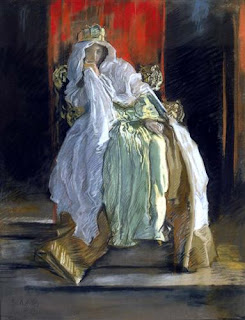 |
| La reine sans Hamlet (1895) Edwin Austin Abbey source Wikiart |
Thoughts:
At least Claudius is not so malevolent as to try to bring about Hamlet’s death; at this point he is only prepared to banish him.
I hadn’t realized before how repulsive were Rosencrantz and Guildenstern’s sycophantic actions. They claim to be Hamlet’s friends, yet how quick they are to work against him.
What is becoming more clear to me in this play is the theme of thought vs. action (or perhaps inaction vs. action). Hamlet has been thinking and agonizing, perhaps overmuch, and bemoans his insufficient action, yet in this scene Claudius perhaps feels that his action (the murder of the king) was done with much force of will, yet little thought and is now regretting his precipitous behaviour. They are both experiencing guilt but from two different, and really opposite, causes.
I was a little confused at Hamlet’s reasoning for not revenging himself on Claudius; because Claudius was at prayer, he’d go to heaven, but if Hamlet could catch him sinning and murder him then, he’d go to hell. Is this more prevaricating by Hamlet? Or is it influenced by a Catholic understanding of faith?
| Claudius at prayer (1844) Eugene Delacroix source Wikimedia Commons |
Hamlet Read-Along Posts




